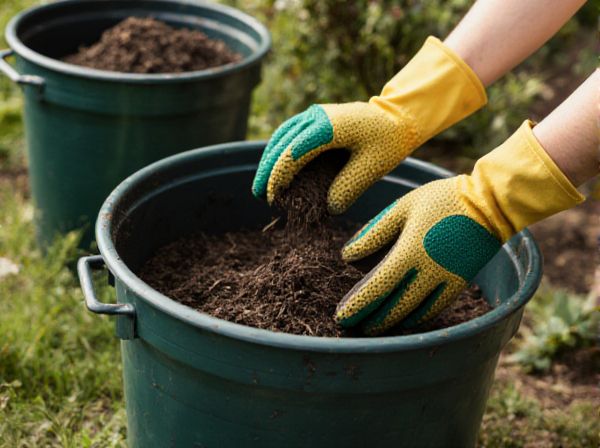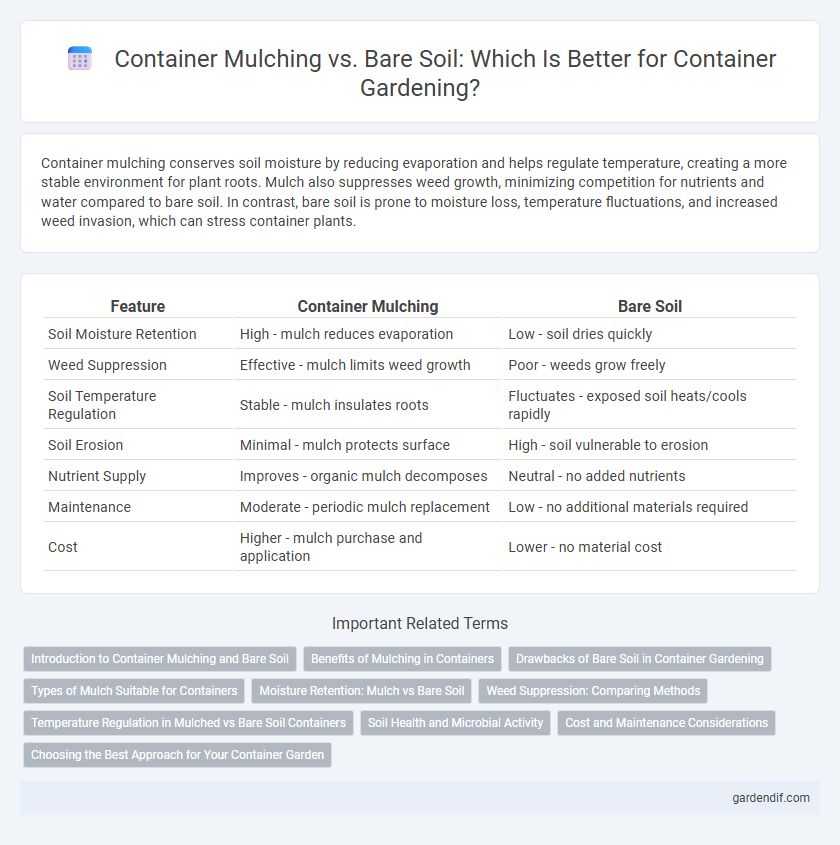
Container mulching vs bare soil Illustration
Container mulching conserves soil moisture by reducing evaporation and helps regulate temperature, creating a more stable environment for plant roots. Mulch also suppresses weed growth, minimizing competition for nutrients and water compared to bare soil. In contrast, bare soil is prone to moisture loss, temperature fluctuations, and increased weed invasion, which can stress container plants.
Table of Comparison
| Feature | Container Mulching | Bare Soil |
|---|---|---|
| Soil Moisture Retention | High - mulch reduces evaporation | Low - soil dries quickly |
| Weed Suppression | Effective - mulch limits weed growth | Poor - weeds grow freely |
| Soil Temperature Regulation | Stable - mulch insulates roots | Fluctuates - exposed soil heats/cools rapidly |
| Soil Erosion | Minimal - mulch protects surface | High - soil vulnerable to erosion |
| Nutrient Supply | Improves - organic mulch decomposes | Neutral - no added nutrients |
| Maintenance | Moderate - periodic mulch replacement | Low - no additional materials required |
| Cost | Higher - mulch purchase and application | Lower - no material cost |
Introduction to Container Mulching and Bare Soil
Container mulching involves covering the soil surface with organic or inorganic materials such as bark chips, straw, or gravel, which helps conserve moisture, regulate soil temperature, and reduce weed growth. In contrast, bare soil exposes the container's substrate directly to environmental elements, leading to faster moisture evaporation, increased soil temperature fluctuations, and higher susceptibility to weed invasion. Effective container mulching enhances plant health and soil quality by minimizing water loss and protecting root systems from extreme conditions.
Benefits of Mulching in Containers
Mulching in containers helps retain moisture by reducing evaporation, promoting consistent soil hydration essential for healthy plant growth. It suppresses weed growth, minimizing competition for nutrients and enhancing root development. Organic mulches also improve soil structure and nutrient content as they decompose, fostering a thriving container ecosystem.
Drawbacks of Bare Soil in Container Gardening
Bare soil in container gardening often leads to rapid moisture evaporation, causing plants to experience drought stress more quickly. It increases the risk of soil erosion and nutrient depletion, reducing the overall health and growth potential of plants. Additionally, exposed soil can encourage weed growth and harbor pests, which compete with container plants for resources.
Types of Mulch Suitable for Containers
Organic mulches such as shredded bark, coconut coir, and composted leaves enhance moisture retention and nutrient availability in container plants. Inorganic options like gravel, pebbles, or landscape fabric prevent soil erosion and improve drainage while providing a clean aesthetic. Selecting the right mulch type for containers depends on plant species, container size, and environmental conditions to optimize growth and health.
Moisture Retention: Mulch vs Bare Soil
Container mulching significantly improves moisture retention by reducing water evaporation compared to bare soil, which rapidly loses moisture through direct exposure. Mulch acts as an insulating layer, maintaining consistent soil humidity and reducing the frequency of watering in potted plants. Studies show that mulched containers retain up to 50% more moisture than bare soil containers, promoting healthier root development and overall plant growth.
Weed Suppression: Comparing Methods
Container mulching significantly enhances weed suppression by creating a physical barrier that limits sunlight exposure to weed seeds, reducing their germination and growth. In contrast, bare soil in containers allows more sunlight and air circulation, promoting weed seed sprouting and requiring more frequent manual removal or herbicide use. Mulch materials like wood chips, straw, or landscape fabric provide long-lasting control, decreasing labor and chemical inputs for effective weed management.
Temperature Regulation in Mulched vs Bare Soil Containers
Mulched containers maintain a more stable soil temperature, reducing fluctuations that can stress plant roots, compared to bare soil containers that experience wider temperature swings. Organic mulch acts as insulation, keeping the soil cooler during hot days and warmer during cool nights, which enhances root health and nutrient uptake. Bare soil containers are more susceptible to rapid temperature changes, potentially inhibiting plant growth and increasing water evaporation rates.
Soil Health and Microbial Activity
Container mulching significantly enhances soil health by regulating temperature and retaining moisture, which fosters a stable environment for beneficial microbial communities. Mulched containers show increased microbial biomass and activity compared to bare soil, promoting nutrient cycling and improving soil structure. This microbial vitality supports robust plant growth and resilience against pathogens in container gardening systems.
Cost and Maintenance Considerations
Container mulching significantly reduces water evaporation and weed growth, lowering overall maintenance costs compared to bare soil. While initial mulching material expenses may be higher, the long-term savings from reduced watering frequency and less frequent weeding offset these costs. Bare soil often requires more frequent watering and weed control, increasing labor and resource expenditure over time.
Choosing the Best Approach for Your Container Garden
Container mulching improves moisture retention, reduces soil temperature fluctuations, and suppresses weed growth, creating an ideal environment for container plants. Bare soil, while simpler to maintain, often leads to faster water evaporation and increased weed competition, which can stress container plants. Selecting the best approach depends on plant type, climate conditions, and maintenance preferences, with mulch generally offering enhanced growth benefits for container gardens.
Container mulching vs bare soil Infographic

 gardendif.com
gardendif.com